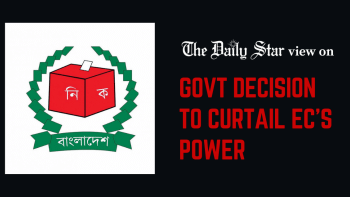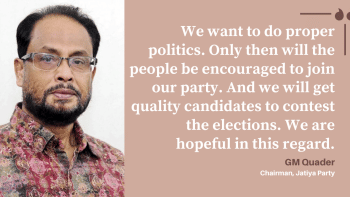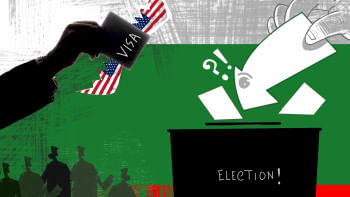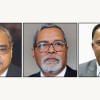Column by Mahfuz Anam: Politics at crossroads

Most national elections, wherever they are held, occupy that country's attention for a maximum of a few months – in some cases, even a few weeks. But for us, it is a multi-year obsession. We started talking about our national election from last year. Now it occupies the centre stage of talks even with some of our most important international partners, namely the United States and European Union; the latter's pre-election assessment mission is already in town, whose findings will significantly impact Western views on the upcoming polls.
With so much attention, one would think that our election must be among the best in the world. Sadly, it is among the most questioned. Even Erdogan's election, who ruled Turkiye as prime minister and president with an iron hand for over 20 years, was not subjected to such scrutiny as ours is and will be. Even the run-off went smoothly with razor-thin margins the first time around. The opposition never accused the all-powerful president of rigging. The reason is simple: everybody – be it the ruling or the opposition party – trusts the process. Our case is the exact opposite.
Even though there are endless talks about the election, there is hardly ever any sensible discussion on it. What we have is regular public utterances of the major political parties, which are mostly acrimonious, defamatory and setting preconditions, but never aimed at narrowing the distance among them. Even after 52 years of independence and 32 years of restoration of democracy – and after all the talks, experiments, debates, international negotiations (there was also an attempt by former US President Jimmy Carter some years back), efforts by the Commonwealth and UN – we still don't have an agreed formula on how to hold a free and fair election.
At the moment, a section of the international community, led by the US, is pressing us to hold a free and fair election. The ruling party interprets this simple and natural demand as a hidden attempt to remove them from power. The opposition hopes that it is a formula that will place them in power. Nobody wants to know, or even asks, what the citizens want.
As taxpayers and law-abiding citizens, we want our freedoms, rights, and good governance. They can only be realised if democracy exists. Democracy, simplistically put, can only flourish if genuine representatives of the people are elected, and that can only happen if elections are free, fair and without violence and money play. We come full circle and end with the focus on free and fair elections.
Journalistically put, our development curve has been moving upwards while our democracy curve has followed an opposite trajectory. The reality today is that our advancement in the economic field is being overshadowed by our setbacks in freedoms, rights, and institutions of accountability. This fact, our government and its leadership do not seem to fully understand. The question it should be asking itself is that after so much development, especially in infrastructure and energy, why widespread dissatisfaction should still exist. The denial of this fact is what has isolated the ruling party from the masses, leading it to suspect that a demand for free and fair elections is aimed at a change of guard at the highest level. With such a record of economic success, it is the Awami League who should confidently move towards an acceptable election and not make questionable laws that further fuel suspicion as to their intentions.
The government move that really launched the downward trend in our democracy, especially the nature and quality of our representative government, is the abolition by the parliament, on June 30, 2011, of the caretaker government system for holding elections. It was done on the basis of a "short order" of a few lines by the Appellate Division, presided over by the then Chief Justice ABM Khairul Haque, delivered on May 10, 2011. Interestingly, the short order also suggested that the system be allowed to continue for one or two more terms. However, the government, without considering that option and without waiting for the full text of the verdict, threw out the caretaker government provision from our constitution. One may recall that it was done by the same party that instituted it after years of mass agitation, economy-crippling hartals, and resignation from parliament following endless walkouts. The way the two subsequent elections – in 2014 and 2018 – were conducted clearly revealed why the ruling party abolished the caretaker government system.
If an election is ultimately the expression of the "public will," measures must be taken so that it can be expressed without fear, especially of repercussions. The institution that is at the centre of the whole process, the EC, must be given full authority and freedom to act, as specified by the constitution. Curtailing its power, that also in the name of democracy, and with the 2014 and 2018 elections still fresh in our memory, really does not cut much ice. A repressive legal structure cannot be expected to deliver a free public will. There have been several promises of amending laws such as the Digital Security Act (DSA) and others, and also restraining law enforcement members from inappropriately using their powers. There is no evidence of that happening yet.
As the world is now looking at us to see how we are preparing for the upcoming national polls, our government has just passed a law that clearly reduces the Election Commission's independence in conducting elections. The amendment bars the EC from cancelling election results and allows it to withhold polling only at specific centres where irregularities occur. The law minister said the EC shouldn't have such powers, it is anti-democratic. But shouldn't the EC have the power to make up its own mind? What happens if violence occurs in the majority of the polling centres in a constituency? Shouldn't the EC suspend the election in the entire constituency even then? The amendment has been kept vague on this point. This will ultimately result in restraining the EC. Experience shows that when a law is vague, the authorities usually shy away from stern action, especially if the candidate is from the incumbent side of the political divide.
The other crucial amendment is shortening the time period during which the EC can act. Previously, it was from the date of the announcement of the election schedule till the official publication of the results, which usually covered a period of 40-plus days. Now, the EC's option is to act only on the "polling day." Even if the EC concludes that sufficient ground exists to apprehend that violence may take place on the election day, it still cannot suspend the election till the very day. It could, before the amendment.
If we really believe in the EC's independence, why tie its hands in this manner?
If an election is ultimately the expression of the "public will," measures must be taken so that it can be expressed without fear, especially of repercussions. The institution that is at the centre of the whole process, the EC, must be given full authority and freedom to act, as specified by the constitution. Curtailing its power, that also in the name of democracy, and with the 2014 and 2018 elections still fresh in our memory, really does not cut much ice. A repressive legal structure cannot be expected to deliver a free public will. There have been several promises of amending laws such as the Digital Security Act (DSA) and others, and also restraining law enforcement members from inappropriately using their powers. There is no evidence of that happening yet.
If politics is the art of compromise, we seem never to have heard of it. If elections are the mechanism of peaceful transfer of power, we never want to practise it. And if democracy is the system where all political parties have a level playing field, we just don't want to play that game.
Can we solve in the next few months what we have been unable to in the last three decades? If we fail, what prospect does it hold for our future?
Mahfuz Anam is the editor and publisher of The Daily Star.

 For all latest news, follow The Daily Star's Google News channel.
For all latest news, follow The Daily Star's Google News channel. 











Comments